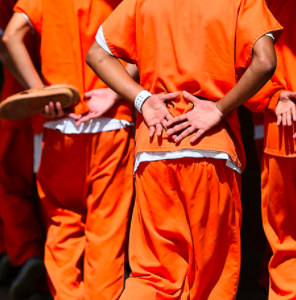The coronavirus has swept through numerous adult jails nationwide, prompting states to release hundreds — if not thousands — of prisoners to avoid its continued spread. Officials in California, New York and Washington state, hotbeds for COVID-19, have released the highest number of prisoners in response to the threat.
But virus mitigating measures are not widespread for the 45,000 kids currently detained in America’s criminal justice system.
Juveniles in some detention centers and correctional facilities are often held in the equivalent of solitary confinement, youth advocates tell InsideSources. These young people are kept in their “cells” 23 hours; are not allowed visits; have limited use of phone or videos to contact their families, and have no access to educators or mental health counselors.
Sarah Hinger, an ACLU senior attorney who deals with juvenile detention issues, says, “all the efforts to mitigate the spread of the virus end up isolating youths in a way that we know is particularly damaging to their mental health and well-being.”
“We have known for some time and with increasing certainty… that detention and more severe contact — particularly within the justice system — are harmful to children and their adolescent development, so whenever possible, that should be minimized,” she told InsideSources. “Here in particular in the pandemic, there is an acute need to look at alternatives to holding youth in detention.”
Hinger said the ACLU is working with youth advocates across the country to get juvenile offenders freed.
Pennsylvania is a prime example of youth advocates pushing for the release of juveniles in detention, while some adults confined in the Keystone state are already on their way home.
Last week, Gov. Tom Wolf announced that certain adult inmates would be released temporarily. Nonviolent inmates due to be released within the next nine months, or vulnerable inmates who are within 12 months of their release date, were being considered.
Meanwhile, a Department of Human Services spokesperson said that on April 6, DHS created intake units at each of Pennsylvania’s youth development centers and youth forestry camps. These are considered correctional facilities after verdicts — while detention centers are for youth awaiting trial.
“Youth in the care of the youth development centers (YDCs) and youth forestry camps (YFCs) continue to receive program services during the COVID-19 crisis, with modifications in place to maximize safety of both youth and staff,” the spokesperson told InsideSources.
“Normal procedures such as dietary, classroom learning, or large therapeutic group sessions are discouraged in order to practice effective social distancing and limit close contact between individuals.”
On April 7, the Pennsylvania Supreme Court denied a juvenile justice advocates’ petition, which called on the release of all children in detention and correction facilities during the coronavirus pandemic.
The petition claimed that juvenile prisoners live in close quarters — which makes it impossible to practice social distancing — and inadequate cleaning supplies prevent staff from properly sanitizing surfaces and shared items like telephones. Efforts to prevent the spread of the virus by isolating children could also have devastating mental health impacts, the petition said.
Pennsylvania youth advocates took the initiative early to warn officials of a possible surge in COVID-19 cases in juvenile detention and correction facilities. The failed petition asked the Supreme Court to review the cases of those juveniles being held.
Instead of issuing the order, the Supreme Court directed judges in county courts to work with officials to assess the capability of facilities to control the spread of the coronavirus.
The Supreme Court also directed judges to work with county officials to identify juveniles who could be released — focusing on circumstances of individual children and the rights of victims.
Marsha Levick, co-founder and chief legal officer of Pennsylvania’s Juvenile Law Center — one of the groups that filed the petition — called the Supreme Court’s ruling “toothless,” adding that “what you do end up with is justice by geography.”
Levick told InsideSources that as of last Friday, Pennsylvania had about 1,829 kids in custody —with the majority in correctional facilities — and it’s hard to monitor their living conditions across the state’s 67 counties.
“There are different kinds of living conditions in juvenile facilities across the state,” Levick said. “In some instances, kids are in single cells. There are some facilities where they might be in a double or triple situation. There are some situations where they [have] dorms, where you might have 12 kids in a space, and honestly [I] am not sure how those facilities” are being managed.
“The point is that solitary confinement — which is essentially what they’re doing as a health measure — is not an appropriate public health strategy for children,” Levick said. “That kind of isolation has significant mental health consequences and aggravates trauma, obviously, nothing that should be surprising.”
Levick said the juvenile confinement facilities “aren’t really equipped to allow for the kind of living standards that we are all imposing on ourselves.”
The Juvenile Law Center will continue its fight by seeking stronger litigation before the state’s federal courts, Levick said.

